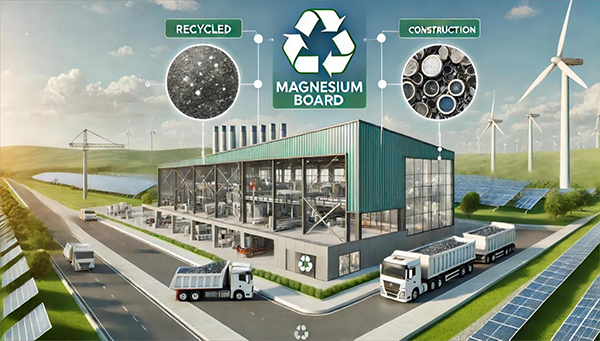Solid waste utilization is a topic of great interest to experts and environmental protection organizations. Magnesium boards excel in this area by effectively utilizing various industrial, mining, and construction waste, and achieving zero waste production, aligning with the principles of a circular economy and non-waste cities.
Absorbing Industrial, Mining, and Construction Waste
Magnesium boards can absorb about 30% of various industrial, mining, and construction waste. This means that during the production of magnesium boards, these solid wastes can be transformed into valuable building materials, reducing landfill waste and environmental pollution. This waste utilization not only helps to reduce environmental burden but also saves waste disposal costs for businesses.
Secondary Recycling of Materials
At the end of their service life, magnesium boards can be crushed and recycled as secondary filler material. This secondary use method further enhances resource utilization efficiency, reduces the need for new resources, and promotes the development of a circular economy. This characteristic makes magnesium boards a key player in the eco-friendly building materials market.
Zero Waste Production Process
The entire production process of magnesium boards generates no wastewater, exhaust gas, or solid waste. This zero-waste production method not only meets environmental protection standards but also reduces production costs and improves efficiency. This makes magnesium boards a truly green building material, highly recognized by environmental organizations and consumers.
Environmental Advantages and Application Prospects
Eco-friendly Building Projects: The solid waste utilization characteristics of magnesium boards make them an ideal choice for eco-friendly building projects. These projects typically require the use of low-carbon, low-pollution building materials, and magnesium boards fully meet these standards.
Urban Infrastructure Construction: In urban infrastructure construction, magnesium boards can be used as an eco-friendly material in roads, bridges, tunnels, and other projects, promoting sustainable urban development.
Corporate Sustainable Development: Using magnesium boards can help companies achieve sustainable development goals, reduce environmental impact, enhance corporate image, and meet consumer demand for green products.
Conclusion
Magnesium boards effectively utilize industrial, mining, and construction waste, achieving resource recovery and zero waste production, and promoting the development of a circular economy. As an eco-friendly building material, magnesium boards offer excellent performance and contribute significantly to environmental protection and sustainable resource utilization. In the future, magnesium boards will be widely used in various fields, providing strong support for building non-waste cities and achieving green development goals.

Post time: Jun-14-2024

